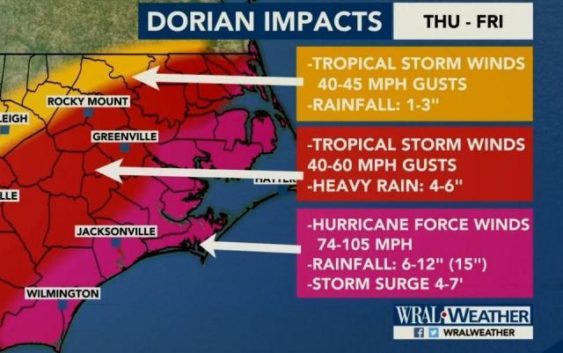UNC researcher worries Dorian is ‘something new’ as another hurricane floods NC coast

BEAUFORT, N.C. – It hasn’t even been a year since Hurricane Florence ravaged parts of North Carolina’s coastline. Now comes Hurricane Dorian, barreling towards the Carolinas as a Category 3.
It’s still unclear if it will become another record-setting “precipitation event” as described by UNC-Chapel Hill researchers in a recent study. But one thing is certain: The frequency of such storms is very concerning, said Hans Paerl, UNC-Chapel Hill hurricane and water quality expert.
“That is something new,” he told WRAL TechWire via phone. “It is something we have not really been able to assess yet with our monitoring programs.”
Back in July, Paerl was the lead author of a study published in Nature Research’s Scientific Reports that cited a “regime shift” underway for coastal North Carolina, with precipitation levels in recent storms being “off the charts.”
The main culprit: climate change, researchers concluded.
A flooding trend
Citing data accumulated since 1898, the researchers noted that six of the largest “highest precipitation events” such as hurricanes and tropical storms have taken place over the past 20 years.
Three of those – hurricanes Floyd, Matthew and Florence – produced wide-spread flooding. Floyd occurred in 1999, Matthew in 2016 and Florence in 2018 – all causing “catastrophic human impacts.”
The probability of these three flooding events occurring in such a short time period is 2 percent, the study noted.
Depending on the amount of Hurricane Dorian’s rainfall, that figure could become even smaller.
‘A lot of problems’
“We’ll just see how that turns out. We’re keeping very careful notes on it,” said the Kenan Professor of Marine and Environmental Sciences at the UNC-Chapel Hill Institute of Marine Sciences.
“I hope we don’t have to re-write the paper, and put yet another let record storm in there.”
Obviously, the consequences could be devastating: flooding, structural damage and water pollution that could take months — if not years — to recover from.
“Having a lot of rain leads to a lot of problems,” said Paerl. “You get a lot of pollutants, of course, that come from the land into our estuary and coastal waters, things like nutrients, urban run off, anything that can make its way down the rivers into our coastal systems, and actually from an ecological perspective, that’s probably our greatest concern.”
UNC study: Flooding from hurricanes, storms is ‘off the charts,’ driven by climate change